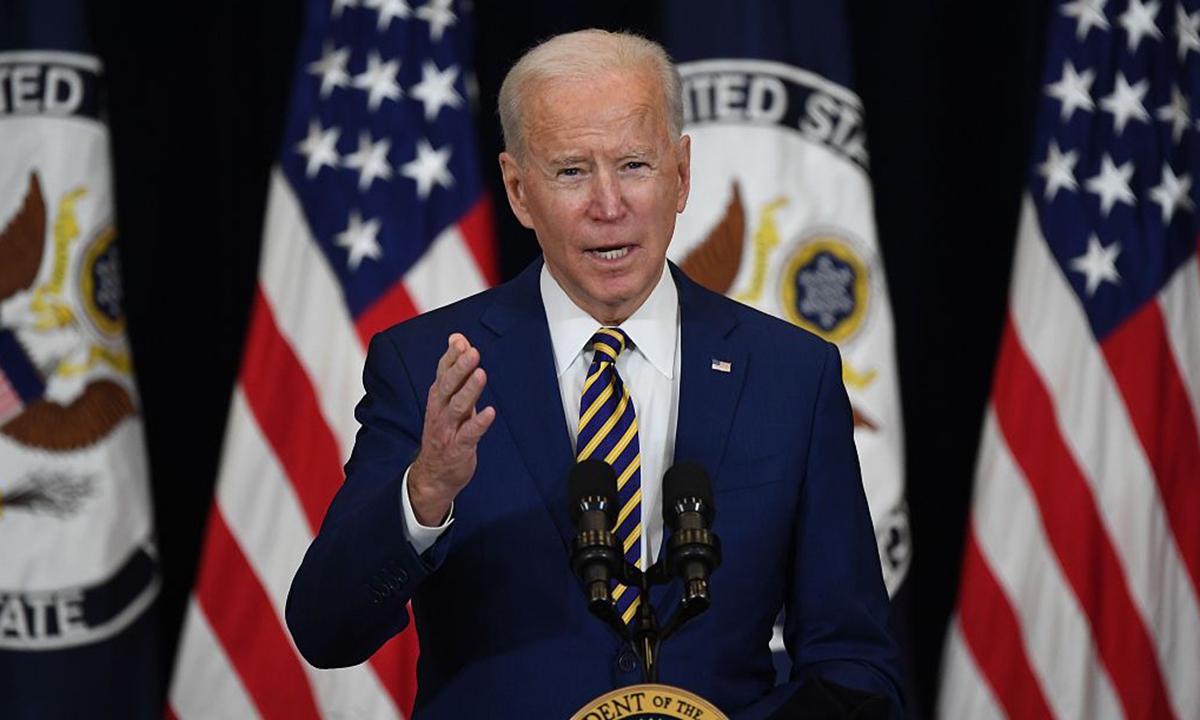
Biden Photo:VCG
US President Joe Biden delivered the new administration’s foreign policy speech on Thursday from the State Department. He emphasized, “America is back” and how important US ties with its allies are. He used the phrase “world” multiple times, vaguely referring to US allies. Biden called China the “most serious competitor” of the US, which has continued the previous administration’s basic attitude toward China, yet he also expressed US willingness to cooperate with China in some areas.
Biden’s speech is in line with the current mainstream perception and sentiment of American society over US foreign relations. On the one hand, it is a foreign policy speech. Yet on the other, Biden was talking to his domestic audiences. It is more of a statement of his stance, with most of the content being major principles, rather than specific policy announcements. For instance, how will the US deal with the Iran nuclear issue, how will it sanction Myanmar’s military leaders and how will it handle the North Korea nuclear issue, Biden did not spell them out.
Biden did not elaborate on China-US ties, but as a matter of fact it is the focus of the speech. His few words sketched extreme US vigilance toward the scenario of China catching up with and even surpassing the US. It mirrored the US’ strategic anxiety toward the “challenges from China” has penetrated and permeated across the entire country, which will be difficult to resolve.
Biden said: “We’ll confront China’s economic abuses; counter its aggressive, coercive action; to push back on China’s attack on human rights, intellectual property, and global governance.” This is an immeasurably vast difference in the perception of China from the Democrat’s last administration. Also on Thursday, White House National Security Adviser Jake Sullivan said a “priority” of the new administration is “dealing with China’s trade abuses” that harm American workers. All above echoes the already formed new “political correctness” in US China policy.
However, Biden expressed his willingness to cooperate with China twice in his 20-minute remarks. The first time, he said the US will engage its adversaries and competitors diplomatically, “where it’s in our interest, and advance the security of the American people.” The second time, he said the US will “work with Beijing when it’s in America’s interest to do so.” This is obviously different from the later period of Trump’s administration, which had only hyped up antagonism between China and the US.
Cooperation with allies has been mentioned most frequently since before Biden assumed office. Biden specifically stressed the US will “repair” its alliances. The US “can’t do it alone” in solving the world’s challenges. The US has never pinned that much attention on ties with allies before Biden’s team assumes office. It is unknown how much resources the US will be able to devote to support such a strategy. In recent vaccine battles, Brussels is strongly dissatisfied with the US.
Generally speaking, after taking power, Biden has showed caution in policy announcements in terms of China. The new team in the White House seems to be shaping an expectation among US society – the new government will keep playing tough with China, but at the same time, it will adjust the previous administration’s practices and carry out cooperation with China in some areas. They will not easily reveal how to do it, maybe because they have not yet figured it out, or maybe they have felt the political sour point in adjusting their China policies. But even if they make relevant adjustments, they will still show a tough attitude in their rhetoric.
Biden stressed to compete with China from a “position of strength by building back better at home.” This shows how his understanding on major power competition differs from that of the Trump administration. The latter attributed all US problems to external forces, especially China. The new perspective may partially affect the policy focus of Biden’s team.
How will Trump’s tariffs on Chinese products be dealt with? Will the blockade on Huawei be relaxed? Will the sudden anti-China policies implemented before Trump stepped down be further carried out or shelved? The Biden administration has so far left them unanswered. Nevertheless, since Biden stressed he would take care of US domestic affairs first, China should be more firm to hold on to its fundamental strategy of doing its own things well.
Biden’s attitude toward China inherits some parts from his predecessor, yet he has also adjusted the approach and made room for interacting with China. For China, the most solid our own strength is, the more positive influence we will have on how the US reviews its China policy.
